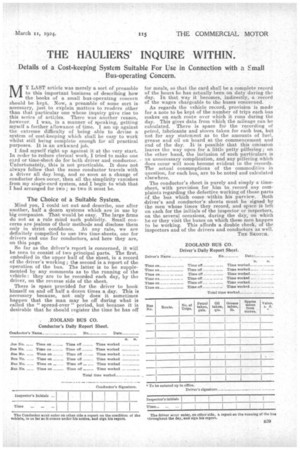THE HAULIERS' INQUIRE WITHIN.
Page 23

If you've noticed an error in this article please click here to report it so we can fix it.
Details of a Cost-keeping System Suitable For Use in Connection with a small Bus-operating Concern.
MY LAST article was merely a sort of preamble to this important business of describing how the books of a small bus-operating concern should be kept. Now, a preamble of some sort is necessary, just to explain matters to readers other than that Particular one whose inquiry gave rise to this series of articles. There was another reason, however. I was, in a manner of speaking, getting myself a further allowance of time. I am up against the extreme difficulty of being able to devise a system of cost-keeping which shall be easy to work whilst still being complete enough for all practical purposes. It is an awkward job.
I find myself right up against it at the very start. In order to reduce clerical work, I tried to make one card or time-sheet do for both driver and conductor. Unfortunately, this is not practicable. It does not always follow that the same conductor travels with a driver all day. long, and so soon as a change of conductor does.occur, then all the simplicity vanishes from my single-card system, and I begin to wish that I had arranged for two ; so two it must be.
The Choice of a Suitable System.
Mind you, I could et out and describe, one after another, half a dozen systems which are in use by big companies. That would, be easy. The large firms do not as a rule mind such publicity. Small concerns are jealous of their methods and disclose them only in strict confidence. At any rate, we are definitely compelled to use two time-sheets, one for drivers and one for conductors, and here they are, on this page.
So far as the driver's report is concerned, it will be seen to consist of two principal parts. The first, embodied in the upper half of the sheet, is a record of the driver's working ; the second is a report of the operation of the bus. The latter is to be supplemented by any comments as to the running of the vehicle : they are to be recorded each day, by the driver, on the reverse side of the sheet.
There is space provided for the driver to book himself on and off half a dozen times a day. This is necessary because, not only does it sometimes happen that the man may be off during what is called the " spread-over " period, but because it is desirable that he should register the time he has off for meals, so that the card shall be a complete record of the hours he has actually been on duty during the day. In that Way it becomes, indirectly, a record of the wages chargeable to the buses concerned.
, As regards the vehicle record, provision is made for a note to be kept of the number of trips each bus makes on. each route over which it runs during the day. This gives data from which the mileage can be calculated. There is space for the recording of petrol, lubricants and stores taken for each bus, but not for any statement as to the amounts of fuel, grease and oil on board at the commencement and end of the day. It is possible that this -omission leaves the way open for a little petty pilfering ; on the other hand, the inclusion of such particulars is an unnecessary complication, and any pilfering which does occur will soon become evident in the records. The actual consumptions of the commodities in question, for each bus, are to be noted and calculated elsewhere.
The conductor's sheet is purely and simply a timesheet, with provision for him to record any complaints regarding the defective working of those parts of. the bus which come within his purview. Both driver's and conductor's sheets must be signed by the men whose times they record, and space is left on each for the initials of the inspector or inspectors, on the several occasions, during the day, on which he or they visit the buses on whieh these men happen to be working. This affords a double check, of the inspectors and of the drivers and conductors as well.
Tun SKOTCH.
































